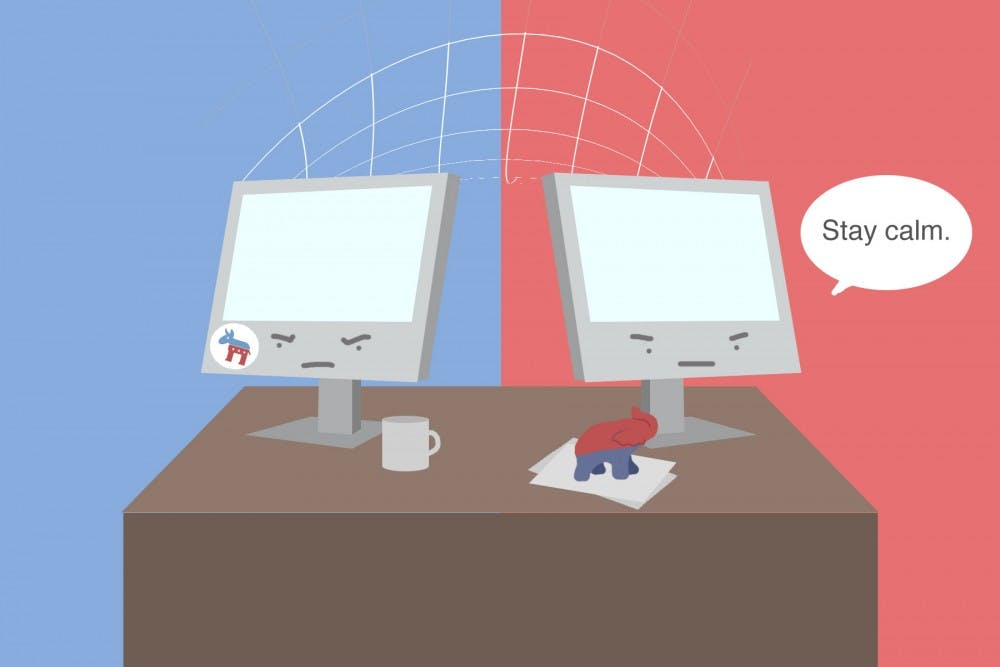Ever since I was a young child growing up in the Boston suburbs, my parents have told me there are two things you never bring up: religion and politics.
That advice makes much more sense when you’re younger and uninformed about the political and social issues in the world, as well as unaware of how to handle disagreement with your peers.
But we are at ASU now — we’re young adults with an intellectual base for our beliefs that we couldn’t have dreamt of in grade school. Whether majoring in political science or engineering, you likely keep up with the news to some extent. And you definitely hold an opinion that another person disagrees with.
But does that mean you should talk about those opinions on Facebook?
I think if you want to, you definitely should. In moderation, political discussion and engagement can inform people on political issues facing the U.S., as well as help engage those in the political process who might not usually be involved.
When used properly, I see it as an extension of the American democratic tradition of civil discourse. Facebook helps extend that tradition to a whole new level because you don’t even have to be in the same room (or the same country) as the person you are talking to.
However, Americans are fairly divided, although there definitely seems to be more opposition than support.
A Pew Research Center study poll conducted last year during the tumultuous 2016 presidential election found that 20 percent of American social media users like seeing political posts on social media, while 37 percent said they were “worn out” by the amount of political posts they were seeing.
An even more telling statistic from that poll: nearly 60 percent of social media users described discussing political issues on social media with someone they disagreed with as “stressful and frustrating,” rather than “interesting and informative.” There was almost no difference in that statistic in regard to those who lean Democrat and those who lean Republican (60 percent to 58 percent respectively.)
Is speaking to someone with an opposing viewpoint sometimes hard? Of course, it is. No one wants to look like they are wrong. And it’s not likely going to change anyone’s beliefs right then and there anyway.
John Genette is a Civil Communication Research Fellow at the Hugh Downs School of Human Communication at ASU. He is also the Founding Director of The Institute for Civil Dialogue, which advocates for civil discussion of controversial issues, using a unique debate format, also called Civil Dialogue.
“We wanted to find a way to have people just talk to each other, develop an understanding so that it wasn't about winning or losing, it was about getting a chance to express your views in a safe place and being able to hear other people do the same,” Genette said.
Genette says that Facebook has the potential to be a good source of political discussion, but it’s uninhibited ruleless format often makes it difficult.
“One of the things that makes Civil Dialogue work is these ground rules, that you're not trying to win a debate, you're not attacking the other person,” Genette said. “There is none of that on Facebook.”
Given Facebook’s disjointed nature, Genette says that the best avenue for Facebook being used to discuss politics that would “enrich beliefs on both sides,” would be a private group created by users that have ground rules, such as a ban on ad hominem attacks.
“I believe that it is urgent and vital that we figure it out because that is kind of the primary source of human interaction right now,” Genette said
"Civil listening is just as crucial to the creation of civil dialogue as speaking is. How can the challenges of our nation be addressed if those in charge are unable to listen to the concerns of the citizens that are affected by them #NeedForCivilDialogue," The Institute for Civil Dialogue's Facebook page said.
The most important rule one should follow whether liberal or conservative: Ask yourself why you are posting about politics on Facebook. Are you doing it raise further awareness to a political issue you care about?
If your answer to that question is that you are doing it to anger the other side, you are only hurting the cause you are seeking to promote, as well as American political discourse in general — no one wants to see Milo Yiannopoulos on his or her news feed after a long day of work.
While ASU can often act as a place to socialize and have fun, at its core, it is an educational institution, and thus a venue where discussion of diverse opinions should flow throughout. Continue that flow by bringing the ideas you learn in your classes to feeds across the university.
There are definitely some potential pratfalls when posting about politics on Facebook. But civil discourse was what America was built on. It survives today in our governmental institutions, our libraries, ASU and yes our news feed.
If you feel a certain way let it be known, and when somebody disputes you, explain why you disagree. That's the meaning of political pluralism.
Reach the columnist at Marinodavidjr@g mail.com or follow @Marinodavidjr on Twitter.
Editor’s note: The opinions presented in this column are the author’s and do not imply any endorsement from The State Press or its editors.
Want to join the conversation? Send an email to opiniondesk.statepress@gmail.com. Keep letters under 500 words and be sure to include your university affiliation. Anonymity will not be granted.
Like The State Press on Facebook and follow @statepress on Twitter.




